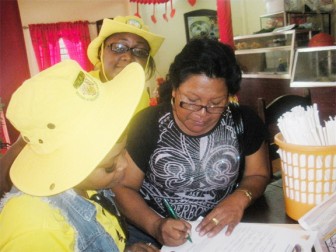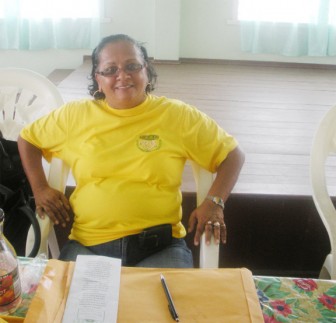Women of Itaballi Landing on the Essequibo River have appealed to the Guyana Women Miners Association (GWMA) to help to train young females in the community so they could find jobs and help others get ownership of their mining claims.
These were some of the issues women who gathered at the Itaballi Community Centre raised with the members of the organisation who travelled to location to sensitise the womenfolk about the GWMA and its aims and objectives.
While the GWMA hopes to empower women miners and all women who work in the mining sector, the women of Itaballi raised various issues hoping the organisation could assist them in some way.

One issue raised by the women was the pending removal of the shops on the community’s waterfront, which, at least two of them indicated, was their only means of making a living.
One woman, who only gave her name as Lorna, was almost in tears as she spoke about the prospect of having to move from the location. She questioned whether the authorities had an alternative location for them and was worried that they may lose sales as the waterfront is where the miners going in and out of the interior are found.

GWMA President Simona Broomes promised the women to raise the matters with the subject ministers and stressed that the organisation wants to give a voice to women, not only in the mining communities, but also those who live in communities that benefit from mining.
“We must stand together and demand more for each other,” Broomes told the small gathering of women and few men recently.
Chairman of the community’s Neigh-bourhood Democratic Council, Cleveland Trotz, who was present at the meeting, indicated that the womenfolk needed to understand that they were squatting at the location. He said they have to take cognizance of what happened in Georgetown where many persons had made the railway embankment their home and in the final analysis they were forced to move. He said Minister of Transport and Hydraulics Robeson Benn had passed through the community and informed the shop owners about the intention to remove them from the area. Some have already been issued notices to vacate.
Broomes, however, maintained that she would raise the issue on behalf of the women as she pointed out that while the women might be squatting it was their only means of making a livelihood and there needed to be an alternative location for them to continue their trade.
Sixty-seven-year-old Babsie Peters asked the organisation to assist her in owning the land she now lives on. She said even though she has been living in the community for the past 27 years the relevant authorities are still to grant her the right to own the land.
“People come long after me and getting to own dem land. Some people own more than one piece and I can’t own none. But I not moving from there I would dead right there,” the elderly woman said.
She later told the Sunday Stabroek that it hurts her that she was one of the first settlers in the community and she still cannot own the land. The frustrated woman said she had begun the process and had the land surveyed but was now being told that the land had to be surveyed again and she did not know where else to turn for help.
Another grandmother asked for transportation to be provided for children living in far flung areas. She related how she walks for miles to take her grandson to school. She is also forced to remain in the community for the entire day until school was finished to take the little boy home.
Meanwhile, Broomes told the women that the GWMA is in the process of developing training programmes that would assist young women who are out of school and out of a job to help them to be marketable.
“Our organisation is not only for those who are in the mining business,” she declared.
This announcement by Broomes was received well by the women who said they were concerned about the young women of the community many of whom were left unsupervised and were not involved in any meaningful activities.
Broomes said the GWMA hoped to work with the government to make the mining sector safe for women even as some of the women enquired about how they can apply for claims in the interior to start mining.
Former parliamentarian and now executive member of the organisation Judith David-Blair told the women that for too long women have taken the backseat in the mining sector.
“It is time we get up and play a vital role,” she said even as she asked those who have husbands in the mining sector to become knowledgeable about their husbands’ work so that if they are called upon to one day take the reins they will be ready.
The perception of women only being involved in sex work when they travel to the interior needs to change, David-Blair said, adding that many women own and operate their own dredges while some are even involved in driving heavy duty vehicles.
Broomes told the women that they are not fighting to get into the mining business as women are already in the business and the authorities need to understand some of the difficulties they are facing in the sector.
“We would not allow men to continue to disrespect our women… and no village, no woman in the mining industry would be left behind,” she said.
The GWMA has since had a fruitful meeting with Minister of Natural Resources & Environment Robert Persaud who has given their idea to set up a model women’s mining site the green light. According to Broomes, the minister said the organisation would be able to choose from whatever land is available through the Guyana Geology & Mines Commission (GGMC) which will be rented to women who own dredges and even those who are now want to enter the mining sector. She said it is for those women who don’t have land and are being exploited. It will be treated like a pilot project and based on its success, copied in other areas.
“We want to have an area where women in mining can mine together, in a secure environment,” Broomes said indicating that the area would have police and a health post for the women.
The government would also assist with equipment such as bulldozers, to assist the women and women will also be trained to use the heavy equipment so they can gain employment from their counterparts. “And we would encourage women to employ women,” she said.
Importantly, the women are also going to be involved in the re-vegetation of the area and the money they would pay for usage of the land would go towards the development of the organisation. Broomes said they have not yet worked out how the beneficiaries would be selected but preference would be given to struggling women miners and those who are members of the organisation. She made reference to the women in Itaballi some of whom have equipment but no mining claim.
Persaud also indicated that police officers and representatives from GGMC and even from other ministries would accompany the organisation on their outreach trips so that they could assist women who are in dire need of assistance right away.
Following the meeting with the Itaballi women, GWMA members also met womenfolk in Bartica and later had a television progarmme.
The organisation’s membership has grown and as the women dressed in their yellow jerseys and matching hats moved through the township of Bartica women approached them and requested to become members.
Meanwhile, the GWMA was very grateful to Canadian High Commissioner David Devine and his Trinidadian counterpart for facilitating some of its members in attending the mining convention in Canada where they were able to network with Women in Mining Canada association and other such associations around the world.





